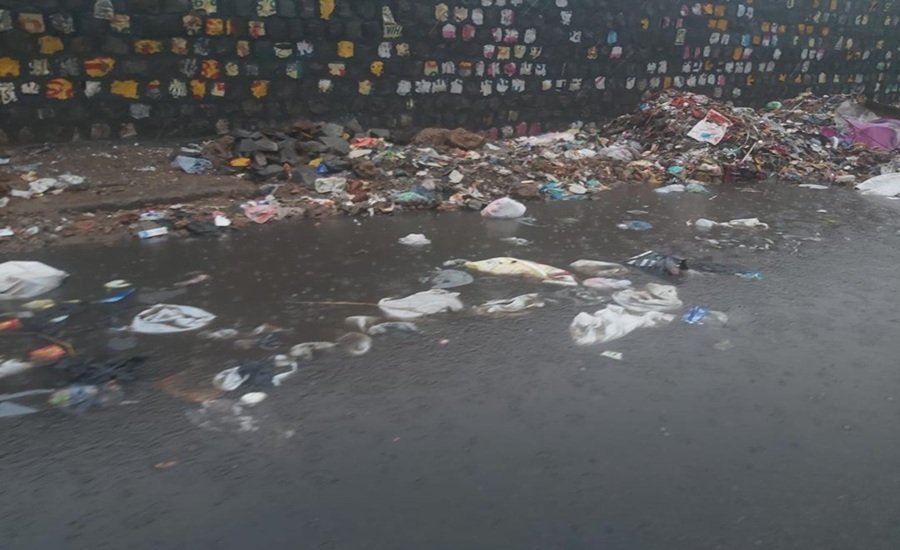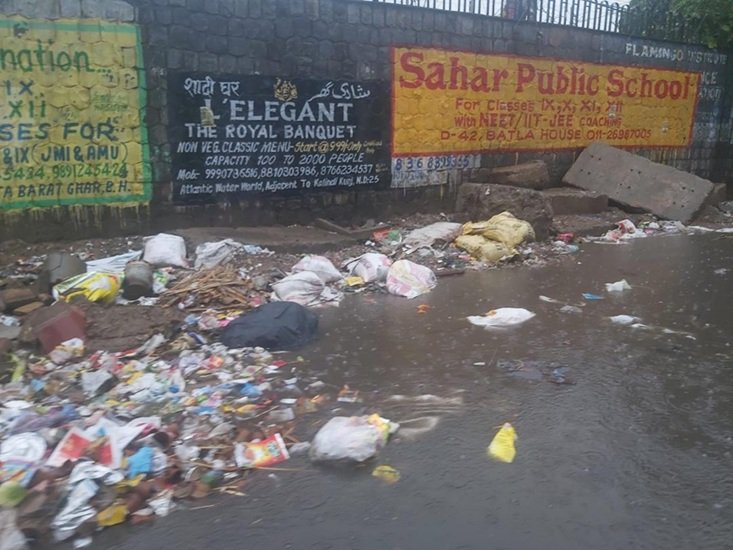MCD fails to provide basic waste management services; Muslim families face unbearable living conditions caused by lack of proper dustbins and irregular garbage collection
NEW DELHI — The garbage crisis in Okhla and nearby areas has reached alarming levels, severely affecting the health and daily lives of local residents. Despite government initiatives like the Swachh Bharat Mission and Bharat Vision 2.4, promises to achieve full scientific waste management and open defecation-free zones remain unfulfilled here. The failure of the Municipal Corporation of Delhi (MCD) to provide essential services has left communities to suffer in silence, surrounded by mounting garbage, foul odour, and serious health risks.
Predominantly Muslims residents of the locality, especially families with small children and elderly members, report worsening health conditions due to the persistent filth. Nadira Sartaj, a resident of Okhla, shared her struggle: “For the last 15 days, I am having trouble breathing. My daughter has a serious heart disease. We have to keep the windows and doors of our house closed so that the nasty, foul smell does not come inside.” She added, “It is not just the smell. The landfill that has been built in the middle of the colony stinks so much that one feels like vomiting as soon as one breathes in it.”

Many families live in fear for their children’s health, with respiratory problems and other illnesses becoming common. The foul stench permeates homes and streets alike, making everyday life intolerable.
One of the major causes of the crisis is the complete lack of dustbins and an official door-to-door garbage collection system. The MCD has neither installed public dustbins nor ensured systematic waste removal from households. Instead, a private and informal system has developed, where workers collect garbage for a fee, leaving poorer families with no option but to discard waste in illegal dumping grounds within the colonies.
A local committee member explained, “Those who have money pay private workers 150 to 200 rupees for collection. But many cannot afford this, so they throw garbage in nearby illegal dumping sites.” These dumping yards have grown unchecked, spreading filth across residential areas.
Efforts to clean the area are hampered by a severe shortage of MCD vehicles and resources. Residents have noted that no official garbage collection vehicles have visited their neighbourhood for seven to eight months. Even when garbage trucks do come, they only collect from main roads, ignoring lanes and bylanes where most garbage accumulates.
Local councillor Nazia Danish lamented, “I am constantly appealing to the government to provide sufficient garbage collection vehicles for the colony. But till now the necessary resources have not been provided, due to which the garbage is not being completely removed from the area.” She further added that the MCD claims a lack of land to install dustbins because most land belongs to other agencies such as the Delhi Development Authority (DDA) or Urban Property Limited (UPL).
The government’s cleaning efforts appear limited and short-lived, focusing mainly on central or VIP areas while neglecting poorer, Muslim-majority colonies like Okhla. Cleaning operations often last only four to five days before the garbage piles up again. Residents accuse authorities of “cleaning for show” to gain political favour but failing to deliver lasting solutions.
“Our Chief Minister, Prime Minister, DC, Mayor, and standing committee members all belong to the same party, yet they only clean for a few days before the garbage returns,” said a frustrated resident.
In response, local residents have formed their own committees to manage the crisis. They have installed loudspeakers warning people not to throw garbage illegally, set up cameras, painted streets, and even installed lights at their own expense to improve safety and cleanliness. Despite these efforts, the lack of official support leaves their work ineffective.

One committee member explained, “We have tried many times to get MCD vehicles to come, but they don’t. We have no sweepers or loaders, and the big vehicles cannot enter narrow streets. We request small Tata loader vehicles that can reach inside, but so far, no response.”
During a recent investigation, it was found that garbage collected by MCD vehicles is often relocated to other illegal dumping grounds nearby, rather than properly processed or disposed of. This cycle of shifting waste only spreads pollution and does not solve the problem.
Furthermore, there is no system for separating wet and dry waste, violating national waste management guidelines. The lack of any serious steps by the MCD is evident in the growing piles of rubbish and the health risks residents face daily.
Local communities are pleading for urgent intervention. They urge authorities to provide sufficient vehicles, install dustbins, assign sweepers, and designate land for waste collection points. Without these, the area’s health and environment will continue to deteriorate.
“We want the government to end this injustice and poor arrangement,” said Nadira Sartaj. “Our area must be made clean and healthy for the sake of our families, especially the children and elderly who are suffering the most.”
The garbage crisis is not limited to Okhla. Cities like Lucknow and Gurgaon also face poor waste management, showing that the failure of municipal bodies is a nationwide issue. This reflects poorly on government claims and highlights the urgent need for real action.
The situation in Okhla reveals a harsh reality for many Indian Muslims living in neglected urban areas. Despite official promises and large-scale missions, the basic right to a clean and healthy living environment remains unmet. It is clear that without genuine political will, adequate resources, and cooperation with local communities, the ongoing garbage crisis will continue to harm the health and dignity of residents.
Residents of Okhla call on the Delhi government and the MCD to stop neglecting their needs and to provide the necessary tools and support to restore their neighbourhoods to a safe and livable condition.

